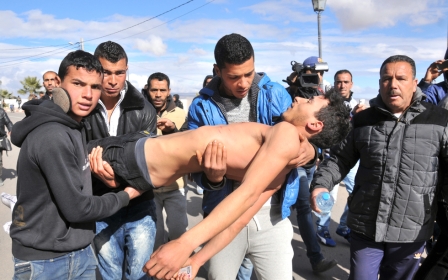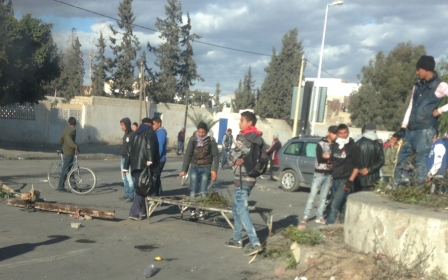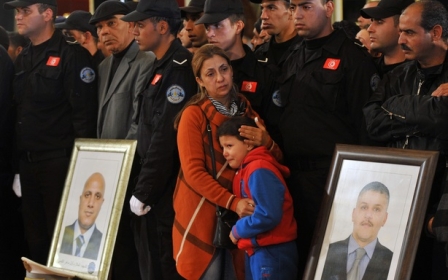Nostalgia for Ben Ali and hopes for new revolution in riot-stricken Tunis suburb
ETTADHAMEN, Tunisia - Residents of a Tunis suburb rocked by rioting and looting were on Saturday clearing up and assessing the damage done to their homes and businesses as a curfew intended to restore order to the streets remained in place.
Supermarkets, shops and banks in Ettadhamen, a densely populated neighbourhood northeast of the centre of the Tunisian capital, were damaged in the unrest on Thursday night, during which at least 261 people were arrested for looting and 84 for breaking the curfew. More than 100 police officers were injured, according to the interior ministry.
“There were more than 100 people involved; young, old, men, women,” said Bachir Metsehel, a 53-year-old petrol station worker who described how he had watched people carry boxes of looted yoghurt to cars and attempt to break into a furniture shop.
Metsehel told Middle East Eye that some locals believed that some young people had been paid by opposition parties to create unrest in order to topple the government.
“I had a comfortable life under Ben Ali,” he said, referring to former Tunisian president Zine El Abidine Ben Ali, who five years ago was overthrown in mass street protests that proved a catalyst for the Arab Spring uprisings in Egypt and elsewhere.
Nearby, the iron facade of an electronics shop is under repair.
“They destroyed the surveillance camera and tried to break open the doors,” said Chaker Ghazouani, the 40-year-old manager.
The looters didn’t manage to get in, and the company has now put all the goods in a safe storage place. A passer-by asked if the shop is open. “No, we are closed for the time being,” Ghazouani answered. “The shop in Sousse and some other cities as well,” he added.
Mohsen Meftah, a 45-year-old doctor, has his office next door. He lives in another part of town and had to hire a few people to protect the building. “During Ben Ali’s days it was quiet here. After he left, we became like orphans.”
One of his security men, Aymen El Ksouri, a large man wearing a black cap, passed by as Meftah was speaking.
“Don’t rub your eyes with a handkerchief,” the doctor tells him and gives him a cigarette.
On Thursday night El Ksouri, 28, had been paid by some of the local shops and businesses to protect their properties.
“I use this stick,” he said, showing a wooden walking stick. The police threw tear gas close to him and his right eye was still watering.
“The people trying to loot the shop were all young boys, between 14 and 20 years old,” he said. “Many of them have been in prison already, on charges of drug dealing or robbery.”
El Ksouri and Mefhah said many people had remained on the streets on Friday night despite the curfew.
“They can’t arrest everyone. Usually they are just brought home,” said Meftah.
El Ksouri said he used to work as a security guard in a hotel in the resort of Hammamet until he lost his job because tourists stayed away following the attack on the Bardo museum in Tunis last March. He then moved back to his family in Ettadhamen.
Italy, or Syria
The neighbourhood is well known for the many people who have either tried to get to Italy on rickety boats or who went to fight in Syria and Iraq.
El Ksouri said he knew at least 30 people who had left for Syria as well as the people who recruit them.
“They are about six people from this area, in their 40s. First they offer you a job with a salary that is too good to be true. Then you get dependent on them and they tell you to travel to Syria. They pay you a lot of money if you do it. Dollars, so surely from outside Tunisia.”
The police know these people, he said. “They bribe the police and are left alone.”
They had tried to recruit him several times, he said, “even though I drink alcohol”.
He added: “If I am not able to find a job I will try to go to Europe.”
To do that he said he would have to pay 2,000 Tunisian dinars ($978) or more to smugglers: “I would do any job, but even landing a job collecting garbage you need the right connections these days.”
El Ksouri said he supported the current peaceful protests in the country but wouldn’t join any demonstration.
“I don’t like to get beaten. We from Ettadhamen don’t have any influence anyway. The president has never visited us. The only thing he has done for us is decrease the price of alcohol,” he said, adding that alcohol abuse was a big problem in the neighbourhood.
At the nearby station, Ines Rouissi, wearing a hat against the cold, and her aunt Rouwtha Rouissi, wearing a headscarf, stand waiting for the tram.
Ines, 28, earns 500 dinars ($244) a month as a surgeon’s assistant and Rouwtha, 45, 350 dinars ($171) in a nearby sewing factory.
“It’s not enough of course to pay the bills, and we have to work too many hours, but it’s better than nothing,” said Ines.
They both grew up in the neighbourhood and said there had always been problems there.
Rouwtha recounted how her telephone was snatched from her last month while she was walking down the street and using it to talk to someone.
“Unfortunately, we also can’t leave our children unattended playing on the street here because children sometimes get kidnapped here by people selling them to organ traders.”
Islamic State fears
Her seven-year-old son recently didn’t want to go to a park because he was afraid Islamic State (IS) supporters would come and take him, she added.
They also regularly hear about boys from their neighbourhood dying in Syria. “The parents are of course not happy when their children leave, even though they receive money.”
Both of them said they were afraid that violence in neighbouring Libya would spread to Tunisia.
“Of course we won’t allow IS to take over the country,” Ines said. “It is worrying though that IS supporters tried to burn down several police stations in the past few days, including the one on this street.”
Not far away, Kamal El Amdouani sat behind a counter in the restaurant that he owns. When the lootings took place, they quickly closed down the restaurant.
“We are used to this and have stayed prepared since the revolution five years ago,” the 45-year-old said.
Because of the curfew, the restaurant closes at 6 pm now instead of 12 pm. He is happy with the curfew and the fact there are more police around now, and he hopes peace will be restored.
“Another revolution would only damage our business,” he said.
In a pizzeria next door, Ouday Boukeri, 25, and Saber Bougali, 26, sat eating chicken, fries and salad. Boukeri works in a company as a technician.
“I found this job by a miracle because I didn’t have any influential connections and didn’t have to pay to get it, like people usually need to do,” he said.
Bougali graduated with a degree in information technology two years ago and is still looking for a job.
Both said they would definitely participate in peaceful protests if a demonstration were organised again in Tunis. They also took part in the revolution five years ago.
“Inshallah, there will be a second revolution,” Boukeri said, raising both hands in the air. “So many things need to change here.”
New MEE newsletter: Jerusalem Dispatch
Sign up to get the latest insights and analysis on Israel-Palestine, alongside Turkey Unpacked and other MEE newsletters
Middle East Eye delivers independent and unrivalled coverage and analysis of the Middle East, North Africa and beyond. To learn more about republishing this content and the associated fees, please fill out this form. More about MEE can be found here.




